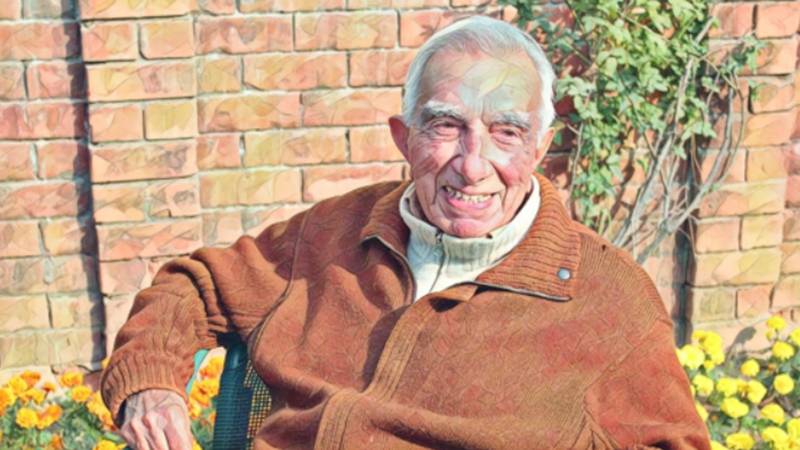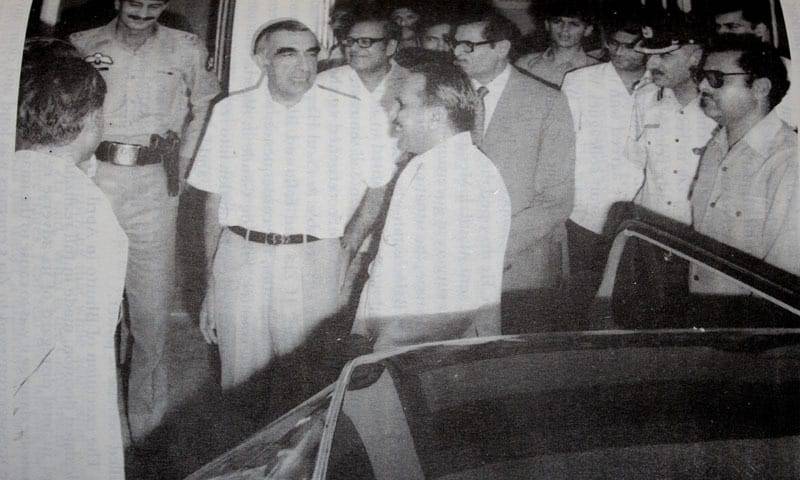
Roedad Khan has passed away this month, at the ripe old age of 101. Born in a village near Mardan in September 1923, he breathed his last in Islamabad on 21 April 2024. During his active life, he was a pillar of the bureaucracy, earning respect for his acumen and financial honesty. He served with five presidents, i.e. Ayub Khan, Yahya Khan, Bhutto, Zia-ul-Haq and Ghulam Ishaq Khan, and knew Farooq Leghari intimately. He was a quintessential bureaucrat who remained part of the inner circles within the corridors of power – from Ayub Khan’s presidential election in January 1965 to the dismissal of government in July 1993.
His bureaucratic career spanned forty years. During his long service, he held many crucial positions. He was Commissioner Karachi, Chief Secretary Sindh and Khyber Pakhtunkhwa (NWFP under his term), and managing director (MD) for Pakistan Television. He remained, at various times, federal secretary for the ministries of Information, Labour, Tourism and the Interior. He was advisor to prime ministers and presidents. His last appointment was as federal minister for Accountability. This is an apt career for a brilliant, hardworking individual. He wrote his autobiography in 1997 titled Pakistan - A Dream Gone Sour and compiled his newspaper articles in four volumes. A brief look into his career would reveal the kind of legacy that he has left behind.

Roedad Khan was Commissioner Karachi during the elections of 1965. Despite massive rigging against Fatima Jinnah, she had won in East Pakistan and Karachi. The regime felt the need to punish the people of Karachi. The day after the elections, Gohar Ayub, the son of the dictator, in the guise of a victory parade, led a raid on the Urdu-speaking community, resulting in the death of over two dozen people. In his book (ibid), Roedad says that he was unaware of the planned parade and that the DIG, too, remained unaware because he had unplugged his phone. This claim of ignorance is strange, coming as it is from the highest civil officials of the city, and hints to their complicity in that first bloody ethnic riot, which was a harbinger of many more to come. Being unaware is the typical defence of bureaucrats in Pakistan to avoid responsibility.
Due to a good education, hard work and high intellect, he was destined to be successful in life. However, he followed in the footsteps of many bright minds in Pakistan's bureaucracy before and after him: the likes of Ghulam Muhammad and Iskander Mirza, Altaf Gauhar and Qudrutullah Shahab
When Yahya Khan took over as the President in 1969, he chose Roedad as MD for Pakistan Television. No military dictator appoints a person to head his propaganda machine unless that official is free of a pricking heart. Roedad controlled the news outlet so efficiently that, in early March 1971, before the army assault in East Pakistan, he was appointed as the Secretary for Information; ostensibly to manage the media fallout of the planned use of excessive military force in subduing political opposition. He was accompanying the president in Dhaka on that fateful day of 23 March 1971 when the military operation was initiated against the people of the eastern wing. Roedad Khan wrote (ibid, pp24) that he was unaware of the military operation. He also claimed ignorance of the expulsion of foreign correspondents from Dhaka by the army before the actual operation was launched a couple of days later; an action that could not possibly have been implemented without his connivance or knowledge.
Strangely, while remaining in the thick of all conspiracies, Roedad claimed to have been unaware of whatever calamity was perpetrated under his careful watch. Persons of better character – Admiral Ahsan, Sahibzada Yaqoob and a few others – had resigned their lucrative posts rather than be part of such inglorious acts.
When Zia imposed his martial law in July 1977, he chose Roedad as his Secretary for Interior. He thus became responsible for law and order, civil intelligence, FIA and all the paramilitary forces. Zia's choice is a significant indicator of Roedad’s usefulness as a willing tool of military juntas. We now know for certain that despite his public protestations to the contrary, Zia had no intention to relinquish power. He, therefore, needed a reliable henchman to ruthlessly suppress the expected domestic opposition and of all the top ranks of bureaucracy of the time, he selected Roedad to do this work. Perhaps, his choice may have been strengthened by the advice of Ghulam Ishaq Khan (GIK), who, as the Secretary General-in-Chief was Zia's trusted civilian hand.

Roedad proved equal to the expectations of the dictator, subduing dissent, going along with the persecution of Bhutto and his family and managing the judiciary. His time in office saw the execution of Bhutto, crushing of the MRD movement, and the exacerbation of ethnic and religious divisions in the country. Under his watch, there was a proliferation of guns and drugs. He was such a trusted member of the government that Zia retained him in the same position until August 1985 by giving him extensions past the retirement age.
Roedad wrote (ibid, pp67) that Bhutto's execution was a cold, calculated decision that was taken with total disregard for its long-term adverse implications. For once, he doesn't even claim to have been unaware of it, though he admits that it still haunted him – perhaps a case of Dostoevsky’s Crime and Punishment. It may have been Zia himself who was keen to eliminate Bhutto. But the judiciary, top bureaucracy and military-intelligence hierarchy were his accomplices and abettors, and Roedad Khan cannot be excluded from this.
In August 1988, Zia died in an air crash and Ghulam Ishaq Khan (GIK), a close friend and patron of Roedad Khan, took over as the President. When GIK and the Army decided to sack the government of Benazir Bhutto, and before the action was executed, the former invited Roedad to join him, first as his advisor and then as minister for Accountability; a cover for hounding Benazir and PPP. Not only that, as caretaker federal minister and a close confidante of the President, he must bear responsibility for the Mehran Bank scandal and the manipulation of the elections of October 1990 in favour of the Islami Jamhoori Ittehad (IJI). Interestingly, he doesn't mention any of these scandals in his memoirs. Perhaps it is because here, too, he could not have claimed ignorance of what was happening under his nose.
Strangely, while remaining in the thick of all conspiracies, Roedad claimed to have been unaware of whatever calamity was perpetrated under his careful watch
For Roedad Khan, the dream of Pakistan being a viable state had ‘gone sour’ as far back as 1996, when he started writing his autobiography. That was before the military manipulated elections early the next year, that granted a ‘two-third majority’ to the PML-N. The train of awful events thereafter has made the country a failed state. Since he was a quintessential insider, it is possible to argue that he was as responsible for the sourness of the dream as much as anyone else in the establishment, judiciary and politics. In fact, it is duplicitous to have served three military dictatorships – the prime cause for the demise of a dignified Pakistan – and then wonder about causes of national failures! Pakistan’s road to failure has its seeds in the initial years of independence, when India took faltering but unwavering steps towards a democratic polity but Pakistan slid towards a bureaucratic state.
Sadly, neither the military, nor the bureaucracy have learned anything from the successive debacles in our history. Roedad Khan remained part and parcel of all these shenanigans and intrigues. Evidently, the tragedy of Pakistan, both in the pre- and post-1971 era, is a series of crimes of commission, and Roedad Khan appears prominently as an accomplice in all these intrigues. Whenever the history of the troubles of Pakistan as a state is written, his name would be included in the list of the dark knights.
Roedad Khan had a brilliant mind. Hailing from a small village in Mardan from a comfortable family background, he got his education from the best institutions of the time, including Islamia College Peshawar, FC College Lahore and Aligarh University. At a young age, he rubbed shoulders with the intellectuals of his time. Due to a good education, hard work and high intellect, he was destined to be successful in life. However, he followed in the footsteps of many bright minds in Pakistan's bureaucracy before and after him: the likes of Ghulam Muhammad and Iskander Mirza, Altaf Gauhar and Qudrutullah Shahab, and many more in the administration, police and finance services, who readily accepted to be Faust at the hands of their respective Mephistopheles. They found it far easier to compromise their souls for worldly gains and career progression than stand up for defence of constitution, implementation of law and promotion of fair practices.
In his later years, he found a good cause in the preservation of Margalla Hills. He would frequently wander through its pristine tracks to find peace and quiet. For a number of years, he remained the President of the Margalla Hills Society, a non-governmental organisation that has lobbied against degradation of the scenic hills in general and the Margalla Hills National Park in particular. He was instrumental in warding off commercial exploitation of the area and in preventing construction of a road tunnel through the hills to Haripur.
In his final years, Roedad admitted in many of his interviews that his generation had failed the nation. He had come to see hope in the younger generation as it galvanised towards PTI.
One cannot help but wonder as to what his reaction would have been if he had been offered a lucrative position by the current establishment, with the task of suppressing the "9th May rioters"!

